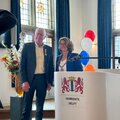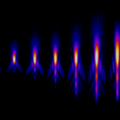Latest News
08 May 2024
Disorder improves battery life

What determines the cycle life of batteries? And, more importantly, how can we extend it? An international research team led by TU Delft has discovered that local disorder in the oxide cathode material increases the number of times Li-ion batteries can be charged and discharged. Their results have been published in Nature.
08 May 2024
Interview H2 Platform

03 May 2024
TU Delft brings hopeful story on critical raw materials

29 April 2024
Royal order for Paul Althuis

Paul Althuis has received a royal decoration. The former director of the Innovation & Impact Centre has been appointed as Officer in the Order of Orange-Nassau. The order was awarded to Althuis by Mayor Marja van Bijsterveldt on Friday in the Delft city hall during the traditional order ceremony (or ‘Lintjesregen’) prior to King's Day.
26 April 2024
Platforms such as Uber thrive on socio-economic inequality

Platforms that offer rides to passengers, such as Uber and DiDi, thrive on socio-economic inequality. By modelling the behaviour of passengers and self-employed drivers, researchers of TU Delft simulated the market for ridesourcing platforms, evaluating a broad spectrum of (in)equality levels in societies. It explains why in some cities ridesourcing services can be big players in the mobility system, while in other cities they don’t get off the ground. This research was published in Nature Scientific Reports recently.
26 April 2024
Five Royal Honours at TU Delft

Professors Paul Althuis, Frances Brazier, DirkJan Veeger, Sabine Roeser and Serge Hoogendoorn all received royal honours on 26 April 2024.
25 April 2024
Rob Mudde to step down after the summer

Professor Rob Mudde will step down from the Executive Board of TU Delft next autumn. He has been a board member since 1 March 2018, as Vice President and Vice Rector Magnificus/Vice President Education (VRM/VPE).
25 April 2024
Grossi emphasises the need of engineers during a visit at TU Delft

At Wednesday 24th of April TU Delft hosted a meeting for Director General Rafael Grossi of the International Atomic Energy Agency (IAEA), students and others interested in the nuclear sector.
23 April 2024
Rubicon grants for Emiel Kruisdijk and Koen Muller

19 April 2024
Problem in microscopy solved after decades

Examining tissues, cells, and proteins under a microscope helps us prevent and combat diseases. To study this, we need to precisely determine the dimensions of the biological structure. However, a biological sample may appear flatter under the light microscope than it actually is. Researchers at Delft University of Technology have now demonstrated for the first time that this distortion is not constant, contrary to what many scientists have assumed for decades. The breakthrough, published in Optica, confirms a prediction by Nobel laureate Stefan Hell from the 90s. With an online calculation tool and software, every researcher can now determine the correct depth of a biological sample.
